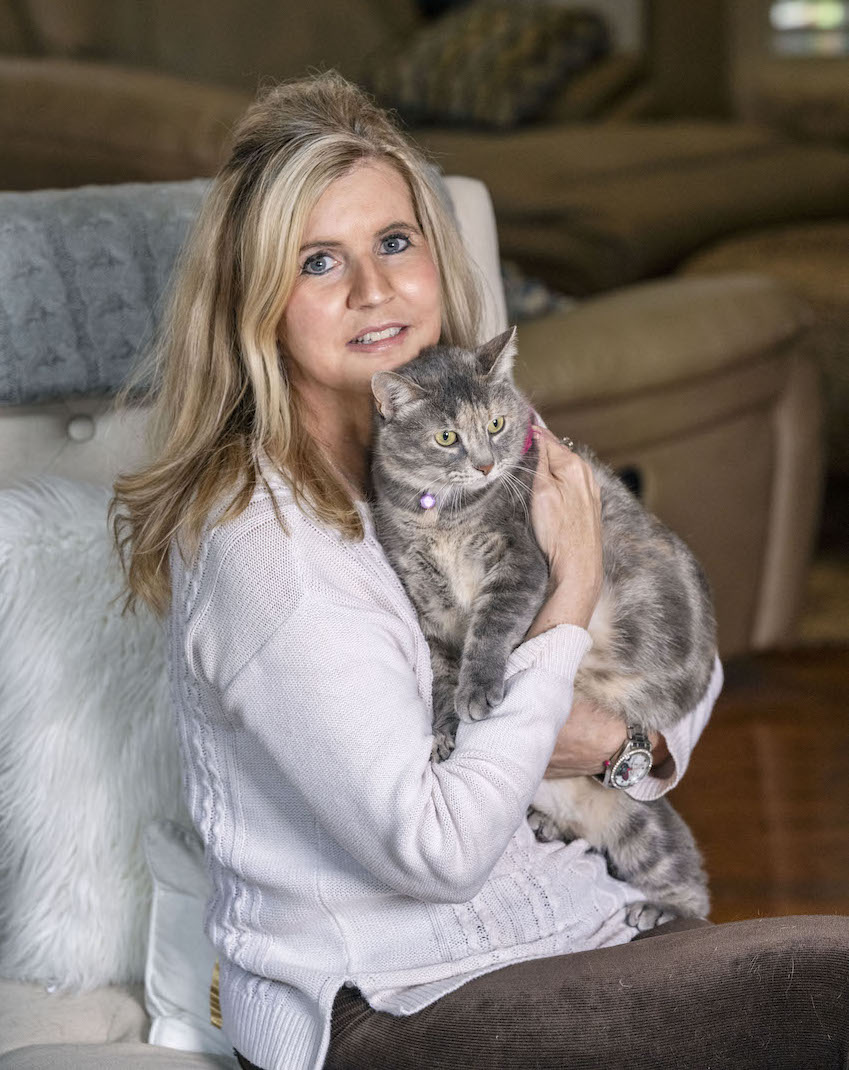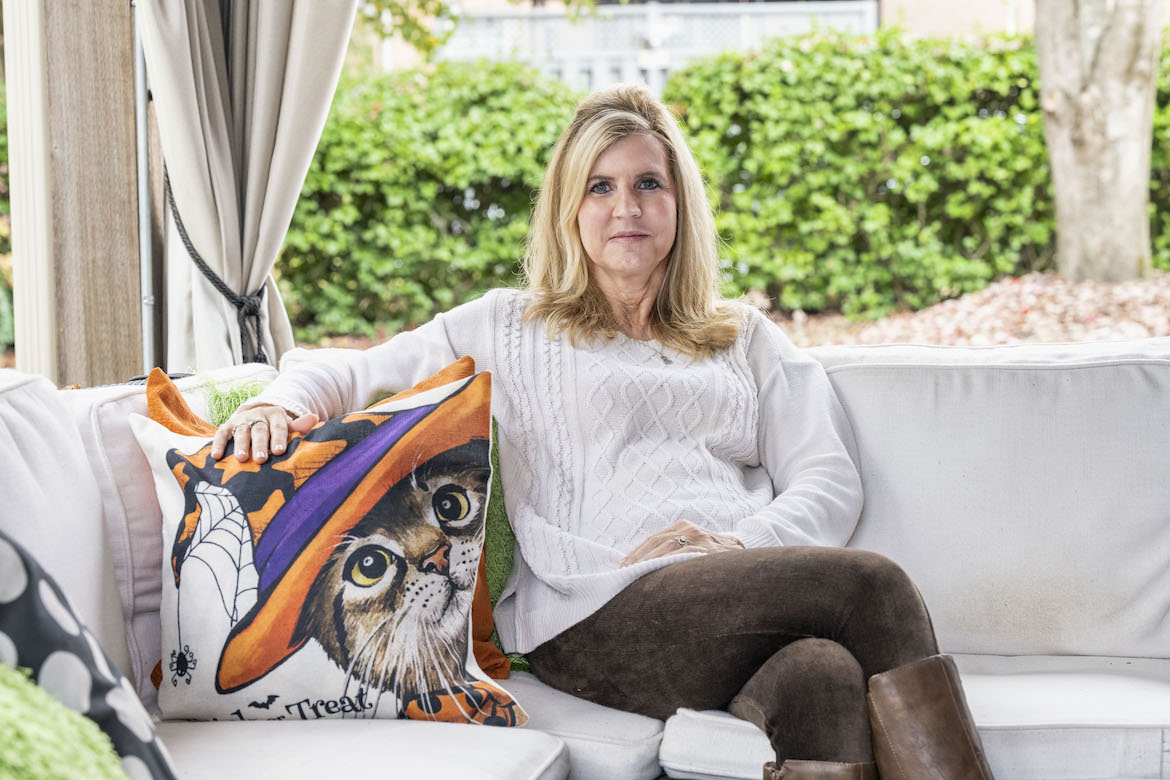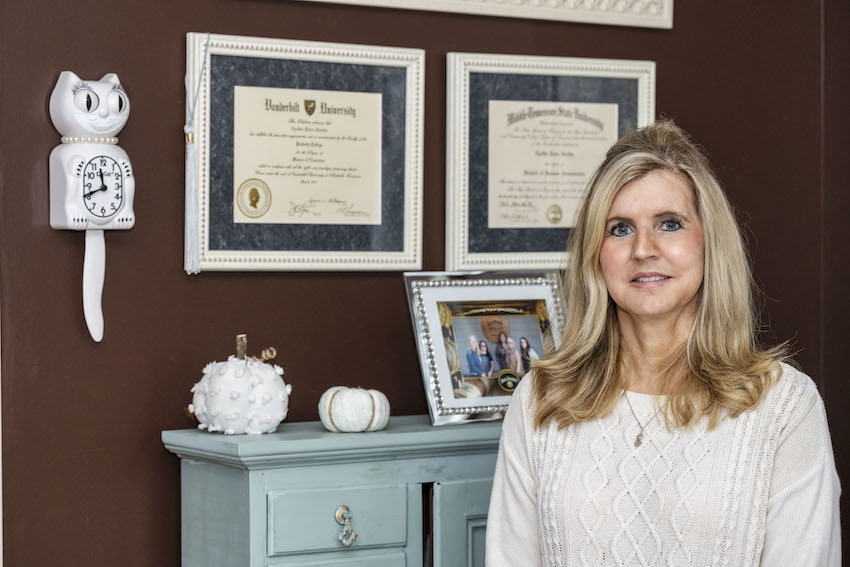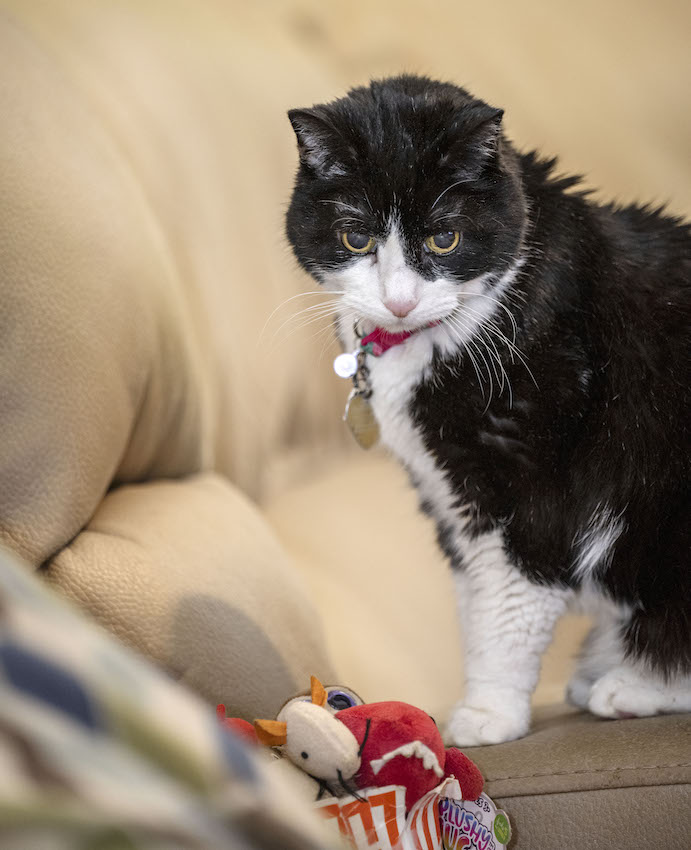Cynthia Chafin total grant funding: $5.04 million
by Drew Ruble
As a student at MTSU, Cynthia Chafin (’88) studied in the Jones College of Business. She said it seemed a logical choice at the time as she was the child of business owners.
Armed with her Business Administration degree, Chafin spent the first five years out of college as an accountant.
“I did okay with it, but something was missing,” she said of her first professional experience. “I figured out I’ve always been personally passionate about any kind of health-related topic.”
From within her business sphere, Chafin smartly shifted her work emphasis over to the then-burgeoning area of corporate wellness.

(Photo by James Cessna)
“This was before they knew they needed someone qualified for those types of positions,” Chafin quipped.
But as Chafin became more and more knowledgeable about health and wellness, her curiosity and passion for it grew. She enrolled at Vanderbilt University and obtained a graduate degree in health promotion and education, then started working with the Tennessee Department of Health.
“I really felt like I was making a difference with people,” she said. “That was my motivation and continues to be my motivation—really doing something for somebody. Making someone’s life better.”
Chafin later had a chance meeting with Martha Jo Edwards, who then held the Adams Chair of Excellence in Health Care Services at MTSU. Edwards asked her to help administer a grant. It marked Chafin’s return to her alma mater, working in MTSU’s Center for Health and Human Services (CHHS) as a project director.
Founded in 1993 through a gift from the Murfreesboro family that created the Adams Chair, CHHS collaborates with agencies and nonprofits to improve the well-being of Tennesseans through training, research, communication, and education. The center’s reach is national, currently working in an 11-state area.
STEMMING THE TIDE
That first project Chafin worked on at MTSU may still qualify as her greatest success in public health. The project that she directed was a tobacco cessation program focused on a very specific population—low-income women who used Health Department services who were pregnant and smoking.
One might think that’s a small segment of the population. But in 2002, when CHHS launched Smart Mothers Are Resisting Tobacco (SMART Moms), Tennessee had the second-highest maternal smoking rate in the nation. More than 29% of the state’s pregnant recipients in the Women, Infants, and Children nutrition supplement program smoked.
Under Chafin’s guidance, SMART Moms became operational in public health agencies in all 95 counties across Tennessee.
“This was before Zoom,” she said. “This was before Teams. We had to travel. We had to do all of this training in person. We trained every health department in the state on effective practices.”
In all, more than 13,000 pregnant women in Tennessee received one-on-one counseling with a provider that Chafin’s team trained.
THERE ARE COUNTLESS PEOPLE OUT THERE WHOSE LIFE HAS CHANGED BECAUSE OF THE WORK WE DO HERE AT THE CENTER.
The result? Of the enrollees, more than 24% stopped smoking, far exceeding both the 14% success rate of similar programs and the goal of 10%.
“That was a much higher success rate than programs that had similar components or parameters nationally,” Chafin said. “So we knew that what we were doing was effective.”

At the conclusion of the study, the state health department decided to continue the program CHHS had established.
“They have repackaged it and renamed it since then, but now every health department in the state continues to offer pregnant women a special program to help them quit smoking,” Chafin said. “That is something that we can be proud of here at MTSU, because at the time there was nothing, and MTSU created this program and gave it life.”
Such early success in the field bolstered Chafin’s decision to use her administrative strengths and passion for health care to improve public health through large grant-funded projects.
“By getting involved in these larger research projects, you can help large numbers of people,” said Chafin, who became CHHS director in 2018. “In my role now, I don’t have as much of the one-on-one interaction. But I know there are countless people out there whose life has changed because of the work we do here at the center.”
THE NEW FRONTIER
Tobacco was a top public health target in 2003. Given the tremendous success of public health smoking cessation efforts like SMART Moms, much progress has been made toward that public health concern.
What is pressing today is opioid usage. Responding to that current need, CHHS and a Wilson County nonprofit coalition recently partnered to address opioid use and misuse in the rural communities of the Midstate county thanks to a $1 million federal grant.

The MTSU center, in partnership with DrugFree WilCo and others, received funding from the Health Resources and Services Administration (HRSA), a branch of the U.S. Department of Health and Human Services. The three-year grant follows completion of an 18-month HRSA-funded planning grant to address the epidemic in those communities.
CHHS is collaborating on this project with Public Health faculty; the University’s Data Science Institute; and other on- and off-campus partners.
“I’m not a substance-use expert,” Chafin said. “What I am an expert at is pulling people together who have different areas of expertise and making a project work.
“I go out into communities and say, ‘Hey, you guys are considered a rural community. You guys are already doing XYZ about the problem. Now how about joining us and working on this grant proposal, because if we get it, we can bring a million dollars into your community.’ ”
That money can be used to provide transportation for people who want to get treatment but can’t, or to pay for treatment for people who are uninsured or underinsured. The money also can be used to conduct “stigma-reduction activities.”
CHHS AND A WILSON COUNTY NONPROFIT COALITION RECENTLY PARTNERED TO ADDRESS OPIOID USE AND MISUSE IN THE RURAL COMMUNITIES OF THE MIDSTATE COUNTY THANKS TO A $1 MILLION FEDERAL GRANT.
“So, for instance, I can sit here and talk to you all day about having high blood pressure or being a diabetic,” she said. “I could sit here and have that conversation comfortably with you. But I may not be able to sit here and say, ‘I have a substance use problem. I’m taking drugs illegally. . . . I keep trying to quit but I can’t. It’s impacting my work and my family.’ Those conversations aren’t as natural because there is a stigma associated with saying ‘I’ve got a substance use problem.’ That’s what we’re trying to counter, whether it’s mental health or substance use or something else.
“We’re trying to normalize it so that people under-stand it’s a disease and people need and deserve treatment for it. It shouldn’t be any different than any other physical condition.”
SCANNING THE HORIZON
What’s next for CHHS?
Chafin is busy expanding the opioids work to other counties, including partnering with the new Physician Assistant (PA) program at MTSU on a rural health and substance use grant.
“This will help them because we will get some of the PAs out into the communities,” Chafin said.

She also may work with MTSU’s Concrete Industry Management program on a grant proposal.
“It’s all about physically connecting people who need public health services with the services,” Chafin said. “It analyzes an area’s infrastructure—roads, bridges, etc.—to support people being able to access health care and other services.”
That potential $3 million federal grant is a pilot program called Connecting Communities.
“What the project does is it takes a real community where, for whatever reason, the roads are not what they need to be, or where, for instance, if something happened to a bridge, it’s the only way out for these people to see their health care providers or get to other needed services or even to work . . . and it puts money into repair or rebuilding,” she said.
Additionally, Chafin is working on a grant proposal with the MTSU School of Nursing aimed at putting more nurses in the pipeline. “There’s huge turn-over in that particular field,” she said.
Regardless of the project, each is a mammoth effort, Chafin said, and requires the help of a talented and tireless staff to make it happen.
“It takes a team to pull all of this off and to keep these grants going. There are so many hands here that touch each project. The whole team is involved in the success of this center,” she said.
CAREGIVER BY NATURE
Chafin’s life outside of work may not involve public health, but it does involve caring for others.
Chafin’s son is a meteorology student at Western Kentucky University. Her daughter attends MTSU and studies in the Recording Industry program. Her husband, who now works for Nissan, has a lengthy history in IT including with music companies.
“I’m actually the only person in my house who has no musical talent,” Chafin said. “So I’m the audience for everyone, and I don’t mind being that.”
In addition to running a family, Chafin also is a self-described physical fitness nut who does all kinds of activities in that area.
She’s also about to finish her doctorate at MTSU.
“I really don’t have much of a personal life right now, but I will again,” she said.

Family, fitness, and her studies aside, about the only thing that rivals Chafin’s passion for public health is her passion for animal health.
“I’m a cat collector,” she confessed. “I have more animals than I know what to do with. At any given time, the number can vary, but I’ve taken care of several colonies of feral cats. Not my choice, they just pick me. I’m a big animal lover.”
Chafin said she’s currently “down to five animals” but admits that number has “been up to 15.”
“But there are only three that are inside,” Chafin said. “The unofficial rule is if you have three or less inside, you are okay. Anything more than three, then you are starting to move into a different (i.e., crazy cat lady). Or so I’ve been told.”
Personally or professionally, Chafin’s motivations seem clear: She wants to help the otherwise help-less to survive and thrive.
Preventative Measures
In 2004, Tennessee’s legislature mandated that every law enforcement officer, firefighter, and EMT in the state be taught how to investigate the death of an infant who dies with no obvious explanation.
Given that tall task, several divisions within the Tennessee Department of Health turned to well-known experts—MTSU’s Center for Health and Human Services (CHHS)—to help fulfill it.

The best practices program CHHS created uses a “train-the-trainer” model, and now online training as well, to reach all 95 counties. To date, more than 27,000 emergency and municipal workers across the state have received this training, directly or indirectly, through CHHS.
Local health departments have better information about which neighborhoods are at high risk for sudden infant death. First responders are better equipped to assess a death scene and help families grieving the loss of a baby. And medical examiners get better information so they can find the true causes of deaths.


COMMENTS ARE OFF THIS POST